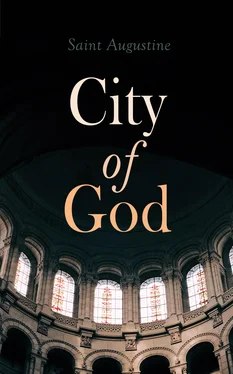Saint Augustine - City of God
Здесь есть возможность читать онлайн «Saint Augustine - City of God» — ознакомительный отрывок электронной книги совершенно бесплатно, а после прочтения отрывка купить полную версию. В некоторых случаях можно слушать аудио, скачать через торрент в формате fb2 и присутствует краткое содержание. Жанр: unrecognised, на английском языке. Описание произведения, (предисловие) а так же отзывы посетителей доступны на портале библиотеки ЛибКат.
- Название:City of God
- Автор:
- Жанр:
- Год:неизвестен
- ISBN:нет данных
- Рейтинг книги:3 / 5. Голосов: 1
-
Избранное:Добавить в избранное
- Отзывы:
-
Ваша оценка:
- 60
- 1
- 2
- 3
- 4
- 5
City of God: краткое содержание, описание и аннотация
Предлагаем к чтению аннотацию, описание, краткое содержание или предисловие (зависит от того, что написал сам автор книги «City of God»). Если вы не нашли необходимую информацию о книге — напишите в комментариях, мы постараемся отыскать её.
City of God — читать онлайн ознакомительный отрывок
Ниже представлен текст книги, разбитый по страницам. Система сохранения места последней прочитанной страницы, позволяет с удобством читать онлайн бесплатно книгу «City of God», без необходимости каждый раз заново искать на чём Вы остановились. Поставьте закладку, и сможете в любой момент перейти на страницу, на которой закончили чтение.
Интервал:
Закладка:
But the reward of the saints is far different, who even here endured reproaches for that city of God which is hateful to the lovers of this world. That city is eternal. There none are born, for none die. There is true and full felicity,—not a goddess, but a gift of God. Thence we receive the pledge of faith, whilst on our pilgrimage we sigh for its beauty. There rises not the sun on the good and the evil, but the Sun of Righteousness protects the good alone. There no great industry shall be expended to enrich the public treasury by suffering privations at home, for there is the common treasury of truth. And, therefore, it was not only for the sake of recompensing the citizens of Rome that her empire and glory had been so signally extended, but also that the citizens of that eternal city, during their pilgrimage here, might diligently and soberly contemplate these examples, and see what a love they owe to the supernal country on account of life eternal, if the terrestrial country was so much beloved by its citizens on account of human glory.
17. To what profit the Romans carried on wars, and how much they contributed to the well-being of those whom they conquered.
For, as far as this life of mortals is concerned, which is spent and ended in a few days, what does it matter under whose government a dying man lives, if they who govern do not force him to impiety and iniquity? Did the Romans at all harm those nations, on whom, when subjugated, they imposed their laws, except in as far as that was accomplished with great slaughter in war? Now, had it been done with consent of the nations, it would have been done with greater success, but there would have been no glory of conquest, for neither did the Romans themselves live exempt from those laws which they imposed on others. Had this been done without Mars and Bellona, so that there should have been no place for victory, no one conquering where no one had fought, would not the condition of the Romans and of the other nations have been one and the same, especially if that had been done at once which afterwards was done most humanely and most acceptably, namely, the admission of all to the rights of Roman citizens who belonged to the Roman empire, and if that had been made the privilege of all which was formerly the privilege of a few, with this one condition, that the humbler class who had no lands of their own should live at the public expense—an alimentary impost, which would have been paid with a much better grace by them into the hands of good administrators of the republic, of which they were members, by their own hearty consent, than it would have been paid with had it to be extorted from them as conquered men? For I do not see what it makes for the safety, good morals, and certainly not for the dignity, of men, that some have conquered and others have been conquered, except that it yields them that most insane pomp of human glory, in which "they have received their reward," who burned with excessive desire of it, and carried on most eager wars. For do not their lands pay tribute? Have they any privilege of learning what the others are not privileged to learn? Are there not many senators in the other countries who do not even know Rome by sight? Take away outward show,212 and what are all men after all but men? But even though the perversity of the age should permit that all the better men should be more highly honoured than others, neither thus should human honour be held at a great price, for it is smoke which has no weight. But let us avail ourselves even in these things of the kindness of God. Let us consider how great things they despised, how great things they endured, what lusts they subdued for the sake of human glory, who merited that glory, as it were, in reward for such virtues; and let this be useful to us even in suppressing pride, so that, as that city in which it has been promised us to reign as far surpasses this one as heaven is distant from the earth, as eternal life surpasses temporal joy, solid glory empty praise, or the society of angels the society of mortals, or the glory of Him who made the sun and moon the light of the sun and moon, the citizens of so great a country may not seem to themselves to have done anything very great, if, in order to obtain it, they have done some good works or endured some evils, when those men for this terrestrial country already obtained, did such great things, suffered such great things. And especially are all these things to be considered, because the remission of sins which collects citizens to the celestial country has something in it to which a shadowy resemblance is found in that asylum of Romulus, whither escape from the punishment of all manner of crimes congregated that multitude with which the state was to be founded.
18. How far Christians ought to be from boasting, if they have done anything for the love of the eternal country, when the Romans did such great things for human glory and a terrestrial city.
What great thing, therefore, is it for that eternal and celestial city to despise all the charms of this world, however pleasant, if for the sake of this terrestrial city Brutus could even put to death his son,—a sacrifice which the heavenly city compels no one to make? But certainly it is more difficult to put to death one's sons, than to do what is required to be done for the heavenly country, even to distribute to the poor those things which were looked upon as things to be amassed and laid up for one's children, or to let them go, if there arise any temptation which compels us to do so, for the sake of faith and righteousness. For it is not earthly riches which make us or our sons happy; for they must either be lost by us in our lifetime, or be possessed when we are dead, by whom we know not, or perhaps by whom we would not. But it is God who makes us happy, who is the true riches of minds. But of Brutus, even the poet who celebrates his praises testifies that it was the occasion of unhappiness to him that he slew his son, for he says,
"And call his own rebellious seed
For menaced liberty to bleed.
Unhappy father! howsoe'er
The deed be judged by after days."213
But in the following verse he consoles him in his unhappiness, saying,
"His country's love shall all o'erbear."
There are those two things, namely, liberty and the desire of human praise, which compelled the Romans to admirable deeds. If, therefore, for the liberty of dying men, and for the desire of human praise which is sought after by mortals, sons could be put to death by a father, what great thing is it, if, for the true liberty which has made us free from the dominion of sin, and death, and the devil,—not through the desire of human praise, but through the earnest desire of freeing men, not from King Tarquin, but from demons and the prince of the demons,—we should, I do not say put to death our sons, but reckon among our sons Christ's poor ones? If, also, another Roman chief, surnamed Torquatus, slew his son, not because he fought against his country, but because, being challenged by an enemy, he through youthful impetuosity fought, though for his country, yet contrary to orders which he his father had given as general; and this he did, notwithstanding that his son was victorious, lest there should be more evil in the example of authority despised, than good in the glory of slaying an enemy;—if, I say, Torquatus acted thus, wherefore should they boast themselves, who, for the laws of a celestial country, despise all earthly good things, which are loved far less than sons? If Furius Camillus, who was condemned by those who envied him, notwithstanding that he had thrown off from the necks of his countrymen the yoke of their most bitter enemies, the Veientes, again delivered his ungrateful country from the Gauls, because he had no other in which he could have better opportunities for living a life of glory;—if Camillus did thus, why should he be extolled as having done some great thing, who, having, it may be, suffered in the church at the hands of carnal enemies most grievous and dishonouring injury, has not betaken himself to heretical enemies, or himself raised some heresy against her, but has rather defended her, as far as he was able, from the most pernicious perversity of heretics, since there is not another church, I say not in which one can live a life of glory, but in which eternal life can be obtained? If Mucius, in order that peace might be made with King Porsenna, who was pressing the Romans with a most grievous war, when he did not succeed in slaying Porsenna, but slew another by mistake for him, reached forth his right hand and laid it on a red-hot altar, saying that many such as he saw him to be had conspired for his destruction, so that Porsenna, terrified at his daring, and at the thought of a conspiracy of such as he, without any delay recalled all his warlike purposes, and made peace;—if, I say, Mucius did this, who shall speak of his meritorious claims to the kingdom of heaven, if for it he may have given to the flames not one hand, but even his whole body, and that not by his own spontaneous act, but because he was persecuted by another? If Curtius, spurring on his steed, threw himself all armed into a precipitous gulf, obeying the oracles of their gods, which had commanded that the Romans should throw into that gulf the best thing which they possessed, and they could only understand thereby that, since they excelled in men and arms, the gods had commanded that an armed man should be cast headlong into that destruction;—if he did this, shall we say that that man has done a great thing for the eternal city who may have died by a like death, not, however, precipitating himself spontaneously into a gulf, but having suffered this death at the hands of some enemy of his faith, more especially when he has received from his Lord, who is also King of his country, a more certain oracle, "Fear not them who kill the body, but cannot kill the soul?"214 If the Decii dedicated themselves to death, consecrating themselves in a form of words, as it were, that falling, and pacifying by their blood the wrath of the gods, they might be the means of delivering the Roman army;—if they did this, let not the holy martyrs carry themselves proudly, as though they had done some meritorious thing for a share in that country where are eternal life and felicity, if even to the shedding of their blood, loving not only the brethren for whom it was shed, but, according as had been commanded them, even their enemies by whom it was being shed, they have vied with one another in faith of love and love of faith. If Marcus Pulvillus, when engaged in dedicating a temple to Jupiter, Juno, and Minerva, received with such indifference the false intelligence which was brought to him of the death of his son, with the intention of so agitating him that he should go away, and thus the glory of dedicating the temple should fall to his colleague;—if he received that intelligence with such indifference that he even ordered that his son should be cast out unburied, the love of glory having overcome in his heart the grief of bereavement, how shall any one affirm that he has done a great thing for the preaching of the gospel, by which the citizens of the heavenly city are delivered from divers errors, and gathered together from divers wanderings, to whom his Lord has said, when anxious about the burial of his father, "Follow me, and let the dead bury their dead?"215 Regulus, in order not to break his oath, even with his most cruel enemies, returned to them from Rome itself, because (as he is said to have replied to the Romans when they wished to retain him) he could not have the dignity of an honourable citizen at Rome after having been a slave to the Africans, and the Carthaginians put him to death with the utmost tortures, because he had spoken against them in the senate. If Regulus acted thus, what tortures are not to be despised for the sake of good faith toward that country to whose beatitude faith itself leads? Or what will a man have rendered to the Lord for all He has bestowed upon him, if, for the faithfulness he owes to Him, he shall have suffered such things as Regulus suffered at the hands of his most ruthless enemies for the good faith which he owed to them? And how shall a Christian dare vaunt himself of his voluntary poverty, which he has chosen in order that during the pilgrimage of this life he may walk the more disencumbered on the way which leads to the country where the true riches are, even God Himself;—how, I say, shall he vaunt himself for this, when he hears or reads that Lucius Valerius, who died when he was holding the office of consul, was so poor that his funeral expenses were paid with money collected by the people?—or when he hears that Quintius Cincinnatus, who, possessing only four acres of land, and cultivating them with his own hands, was taken from the plough to be made dictator,—an office more honourable even than that of consul,—and that, after having won great glory by conquering the enemy, he preferred notwithstanding to continue in his poverty? Or how shall he boast of having done a great thing, who has not been prevailed upon by the offer of any reward of this world to renounce his connection with that heavenly and eternal country, when he hears that Fabricius could not be prevailed on to forsake the Roman city by the great gifts offered to him by Pyrrhus king of the Epirots, who promised him the fourth part of his kingdom, but preferred to abide there in his poverty as a private individual? For if, when their republic,—that is, the interest of the people, the interest of the country, the common interest,—was most prosperous and wealthy, they themselves were so poor in their own houses, that one of them, who had already been twice a consul, was expelled from that senate of poor men by the censor, because he was discovered to possess ten pounds weight of silver-plate,—since, I say, those very men by whose triumphs the public treasury was enriched were so poor, ought not all Christians, who make common property of their riches with a far nobler purpose, even that (according to what is written in the Acts of the Apostles) they may distribute to each one according to his need, and that no one may say that anything is his own, but that all things may be their common possession,216—ought they not to understand that they should not vaunt themselves, because they do that to obtain the society of angels, when those men did well-nigh the same thing to preserve the glory of the Romans?
Читать дальшеИнтервал:
Закладка:
Похожие книги на «City of God»
Представляем Вашему вниманию похожие книги на «City of God» списком для выбора. Мы отобрали схожую по названию и смыслу литературу в надежде предоставить читателям больше вариантов отыскать новые, интересные, ещё непрочитанные произведения.
Обсуждение, отзывы о книге «City of God» и просто собственные мнения читателей. Оставьте ваши комментарии, напишите, что Вы думаете о произведении, его смысле или главных героях. Укажите что конкретно понравилось, а что нет, и почему Вы так считаете.












